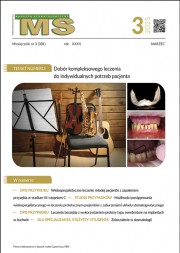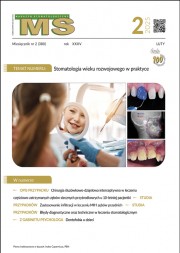Dostęp do tego artykułu jest płatny.
Zapraszamy do zakupu!
Po dokonaniu zakupu artykuł w postaci pliku PDF prześlemy bezpośrednio pod twój adres e-mail.
ARTYKUŁ PRZEGLĄDOWY
Co lekarz dentysta powinien wiedzieć na temat bisfenolu A?
What a dentist needs to know about bisphenol A?
Aneta Bartoszyńska, Aleksandra Kobierzycka
Streszczenie
Bisfenol A jest jednym z najpowszechniej wykorzystywanych związków na świecie. Występuje między innymi w butelkach plastikowych, płytach CD czy materiałach kompozytowych. Wszechstronne zastosowanie bisfenolu A stało się powodem licznych badań naukowych nad bezpieczeństwem jego wykorzystywania. W związku z tym, że związek ten występuje także w stomatologii, ważne aby lekarz dentysta potrafił ocenić ryzyko związane z jego stosowaniem.
Abstract
Bisphenol A is one of the most widely used compounds in the world. It is found, among others, in plastic bottles, CDs or composite materials. The comprehensive use of bisphenol A has become the reason for numerous scientific studies on the safety of its use. Due to the fact that this compound is also present in dentistry, it is important that the dentist be able to assess the risks associated with its use.
Hasła indeksowe: bisfenol A, analogi bisfenolu A, kompozyty bez BPA
Key words: bisphenol A, bisphenol A analogs, BPA-free dental composites
Piśmiennictwo
- A.P. Dianin Журнал Русского физико-химического общества. 1891; 23: 492.
- ECHA. Bisfenol A. Online: https://echa.europa.eu/pl/hot-topics/bisphenol-a [dostęp: 29.04.2021].
- Lee S, Suk K, Kim IK i wsp. Signaling pathways of bisphenol A-induced apoptosis in hippocampal neuronal cells: role of calcium-induced reactive oxygen species, mitogen-activated protein kinases, and nuclear factor-KB. J Neurosci Res. 2008; 86(13): 2932–2942.
- Brotons JA, Olea-Serrano MF, Villalobos M i wsp. Xenoestrogens released from lacquer coatings in food cans. Environ Health Perspect. 1995; 103(6): 608-612.
- Cimmino I, Fiory F, Perruolo G i wsp. Potential Mechanisms of Bisphenol A (BPA) Contributing to Human Disease. Int J Mol Sci. 2020; 21(16): 5761.
- Rogala D, Kulik-Kupka K, Spychała A i wsp. Bisfenol A – niebezpieczny związek ukryty w tworzywach sztucznych. Probl Hig Epidemiol. 2016; 97(3): 213-219.
- EFSA. Bisphenol A. Online: https://www.efsa.europa.eu/en/topics/topic/bisphenol [dostęp: 29.04.2021].
- Kyong Moon M. Concern about the Safety of Bisphenol A Substitutes. Diabetes Metab J. 2019; 43(1): 46-48.
- Dursun E, Fron-Chabouis H, Attal JP i wsp. Bisphenol A Release: Survey of the Composition of Dental Composite Resins. Open Dent J. 2016; 10: 446-453.
- Löfroth M, Ghasemimehr M, Falk A i wsp. Bisphenol A in dental materials - existence, leakage and biological effects. Heliyon. 2019; 5(5): e01711.
- Šimková M, Tichy A, Dušková M i wsp. Dental composites - a low-dose source of bisphenol A? Physiol Res. 2020; 69(Suppl 2): S295-S304.















